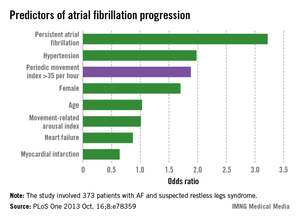In patients with restless legs syndrome, frequent leg movements during sleep were associated with the progression of atrial fibrillation, reported Dr. Mahek Mirza and her associates.
In their study, 205 patients with more than 35 leg movements per hour were more likely (odds ratio, 1.88) to experience progression of atrial fibrillation during a median of 33 months of follow-up, compared with 168 patients with atrial fibrillation who had a periodic movement index of 35 or less, reported Dr. Mirza of the center for integrative research on cardiovascular aging, Aurora Health Care, Milwaukee, Wis., and her associates.
In the group of patients with a high frequency of leg movements during sleep, those treated with dopaminergic drugs were less likely to experience atrial fibrillation progression (11.6%), compared with those who were not treated (32%). No treatment difference in progression was seen among patients with a low frequency of leg movements, the investigators reported (PLoS One 2013 Oct. 16;8:e78359 [doi:10.1371/journal.pone.0078359]).
Dr. Mirza and one of her associates were supported by grants from the National Heart, Lung, and Blood Institute. The investigators said they had no relevant financial disclosures.


